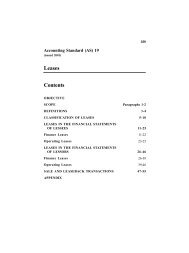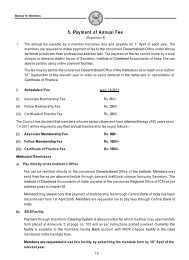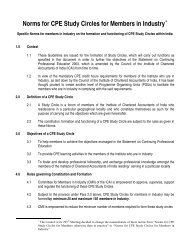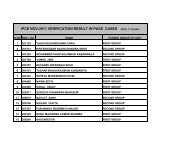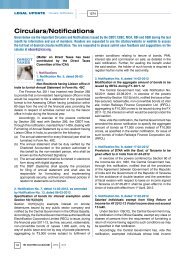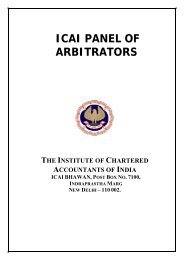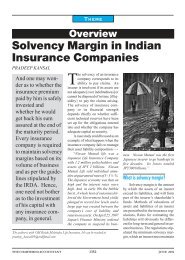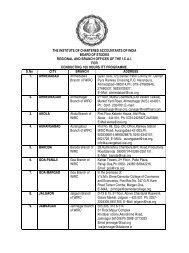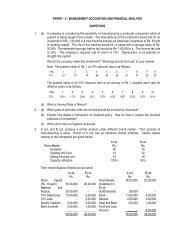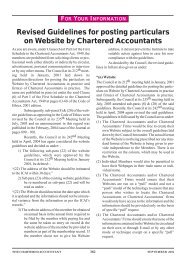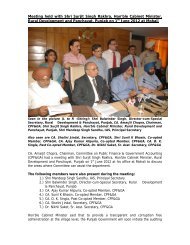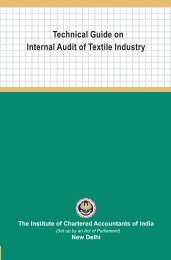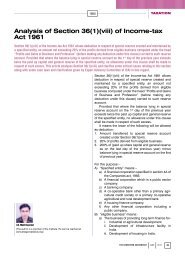The Chartered Accountant
The Chartered Accountant
The Chartered Accountant
Create successful ePaper yourself
Turn your PDF publications into a flip-book with our unique Google optimized e-Paper software.
Appellant/assessee is a multi-state Cooperative Society<br />
engaged in the business of manufacturing urea<br />
and ammonia at its Plant at Hazira. Appellant used to<br />
supply ammonia gas through pipe connections from<br />
its plant at Hazira directly to the Heavy Water Plant<br />
(HWP) of the Heavy Water Board (HWB). <strong>The</strong> HWP<br />
is located next to the appellant’s plant. In fact, it is in<br />
the precinct of the appellant’s plant. In view of an<br />
agreement executed between the appellant and HWB,<br />
appellant was entitled to be reimbursed for the cost<br />
of ammonia manufactured by it and supplied to the<br />
HWB and in addition thereto it was also entitled to<br />
receive service charges and incentives from HWB.<br />
<strong>The</strong> Commissioner (Appeals) held that since the receipt<br />
of service charges was not directly connected or<br />
linked with the manufacturing activity carried out in<br />
the industrial undertaking of the assessee, the service<br />
charges received by the assessee from the activity of<br />
producing Heavy Water cannot be considered as the<br />
DECEMBER 2008 998 THE CHARTERED ACCOUNTANT<br />
LEGAL UPDATE<br />
profit derived from its industrial undertaking so as to<br />
qualify for deduction under Section 80-I.<br />
<strong>The</strong> Supreme Court held that prima facie one finds<br />
that Hazira Ammonia Extension Plant (HAEP) is<br />
an extension of the Ammonia Plant of the appellant<br />
then the question which arises is whether the above<br />
process constituted manufacturing activity carried out<br />
in the industrial undertaking of the appellant. Another<br />
feature to be noticed in this regard is that the Department<br />
of Atomic Energy entered into an agreement<br />
with the appellant to set up HAEP in the premises<br />
of the appellant’s Ammonia Plant. Hence, the entire<br />
scheme was based on the principle of functional interdependence<br />
between the two plants.<br />
On the above discussion the judgment of the High<br />
Court was set aside and the matter was remitted back<br />
to the Tribunal for reconsideration of the matter in accordance<br />
with law.<br />
Sections 273A read with Section 139(8) of the Income-tax Act, 1961 — Penalty — Power to Reduce or Waive,<br />
in certain cases [Assessment Year 1985-86 to 1989-90]<br />
Late filing of return by itself cannot be the only reason to reject an application for waiver of penalty in case of<br />
return filed voluntarily and in good faith<br />
Madhuri, Akola v. Commissioner of Income Tax, Vidarbha Region, Nagpur (BOM) 7 August, 2008<br />
<strong>The</strong> petitioner is a house wife and earning through<br />
the private tuitions. She voluntarily submitted the returns<br />
of income in good faith and in response to the<br />
general representation by the Deputy Commissioner<br />
of Income Tax, that department would be waiving interest<br />
and penalty of those who have not filed returns<br />
though have assessable income. Returns were duly<br />
accepted by Assessing Officer under Section 143(1).<br />
However, the petitioner’s request for waiver of interest<br />
and penalties was rejected.<br />
<strong>The</strong> High Court held that in the instant case there<br />
was no dispute that the return was filed before any<br />
demand notice was issued by the department. <strong>The</strong> returns<br />
were admittedly filed late but considering the<br />
scheme of Section 273A and as all the ingredients are<br />
available, the Assessing Officer ought to have considered<br />
the case in view of the scheme and purpose of<br />
Section 273A. <strong>The</strong> reason given by Assessing Officer<br />
to reject petitioner’s application was insufficient and<br />
there was failure to consider all the elements to exercise<br />
the power and discretion as contemplated under<br />
scheme of the Section 273A. <strong>The</strong> late filing of return<br />
by itself cannot be the only reason to reject the application<br />
in case of return filed voluntarily and in good<br />
faith like present one, as those were filed even prior to<br />
the notice or any such demand.<br />
<strong>The</strong> petition was allowed.<br />
Section 273A read with Sections 139(8) and Section 217 of the Income Tax Act, 1961 — Penalty — Power to<br />
Reduce or Waive, in certain cases [Assessment Year 1984-85 to 1988-89]<br />
Section 273A(1)(a) requires a disclosure of full and true income and not the filing of valid returns in time before<br />
issue of notice under Section 139(2) or Section 148<br />
Vasantbhai Jethalal Lathiwala v. Commissioner of Income Tax, Vidarbha Region, Nagpur (BOM) 7 August, 2008<br />
<strong>The</strong> petitioner is a Karta of HUF. He voluntarily and<br />
in good faith pursuant to the assurance given by the<br />
Income Tax Department made a full and true disclosure<br />
of his income before issuance of any notice.<br />
<strong>The</strong> respondent issued notice under Section 148.<br />
<strong>The</strong> Income Tax Officer charged interest for all the<br />
years under Section 139 for late filing of returns and<br />
charged interest under Section 217 for nonpayment<br />
of advance tax. <strong>The</strong> Commissioner has rejected the<br />
application filed by the petitioner.<br />
<strong>The</strong> High Court observed that the Commissioner has<br />
relied the case of Saberaj Industries vs. F.J.Bahadur



